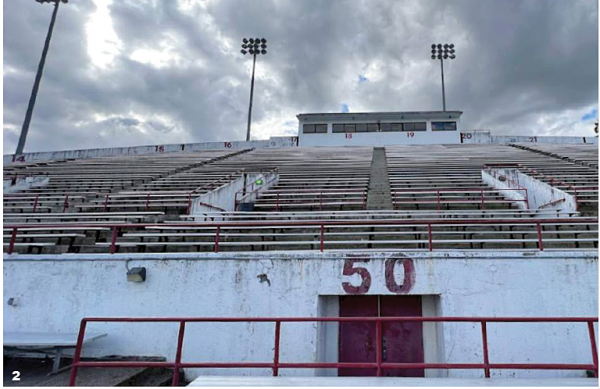April 3, 2024

The present-day conditions at White Stadium. File photo
The March 22 decision by Suffolk Superior Judge Sarah Weyland Ellis to reject a motion by opponents who sought to halt work on a project to renovate White Stadium handed a victory to the Wu administration and the Boston Unity Soccer Partners, owners of a private professional soccer team that has pledged $50 million to help modernize the decrepit city-owned facility. But, the ruling is also a win for residents across the city, particularly Boston student-athletes who have long been denied access to a state-of-the-art sports facility in the heart of the city.
In a statement praising the judge’s decision, Mayor Wu said: “For decades, Boston student athletes and community members have watched plans for revitalizing this historic facility come and go without tangible progress.”
We agree. That is why we support Mayor Wu’s decision to leverage the financial support needed to make what she calls a “generational investment” that could transform White Stadium into an asset that Bostonians from all walks of life can enjoy, use, and compete in.
The idea has its share of critics. Some argue that the plan is moving too quickly and hasn’t accounted for traffic drawn to the pro soccer team’s games. Others say that student-athletes who presently use the stadium during football season will be negatively impacted. Still others say that Franklin Park was never intended to be used for private enterprise— and that the public is at-risk of being displaced.
These are not unreasonable critiques. And yet none present insurmountable obstacles.
The benefits of fixing a stadium that will be used by Boston kids and other residents for the majority of the year outweigh the reservations that animate the most vocal of opponents. A survey conducted by the Franklin Park Coalition, which engages stakeholders and programs events at the park year-round, indicates that there’s considerable support for the stadium project to move forward— even among those of us who might find fault with specific elements of the pro soccer team— or don’t know enough about it. In fact, only 20 percent of the 700 people who participated said they were definitely against the idea. That leaves four-fifths who are at least open to it, if some of their concerns are addressed.
Mayor Wu should be commended for advancing this proposal to this stage, even in the face of more outlandish critiques that have portrayed this project in the most negative light possible. One over-the-top opponent went so far as to compare Judge Ellis’s ruling to the infamous Dred Scott decision that upheld chattle slavery in the 1850s. How absurd and unhelpful.
There are those who suggest, quite cavalierly, that the Wu administration should just pay for stadium improvements without the private partnership dollars that cut the city’s costs in half. But that’s the sort of pie-in-the-sky thinking that’s left our kids with a leaky, paint-chipped, run-down, third-rate stadium for generations.

This proposal is at once a fiscally-prudent and bold step forward to make significant improvements that will benefit our kids— including thousands of student-athletes, a great many of them first-generation Bostonians, who play soccer.
The mayor and her team have put Boston in a prime position to score big with this proposal. Now, it’s time to hear more from the Boston Unity Soccer Partners, whose executive team can and should fully explain the benefits they intend to bring to our neighborhoods.
We’ve invited those partners to make their case for their side of the project— and how it will impact our communities in the near and long term. So far, city officials and neighborhood allies have done that heavy lifting. It’s up to the BUSP squad to make the final sale to the people in our neighborhoods who might not be on their side of the pitch just yet.
Bill Forry is the editor and co-publisher of the Reporter. Follow him @BillForry.
Villages:



